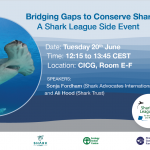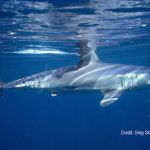Author: Ian Campbell, Project AWARE, Associate Director Policy and Campaigns.
This year has certainly been a busy one for those of us in the world of shark conservation, especially when it comes to the two fastest shark species, shortfin and longfin makos. In March, the IUCN reclassified both species from Vulnerable to Endangered on the IUCN Red List, highlighting the urgent need for protection. For much of 2019, shark conservationists focused on securing international trade controls for makos through listing under the Convention on International Trade in Endangered Species (CITES) at the Conference of Parties (CoP) in August. Multiple organisations, including our Shark League partners, helped highlight the precarious status of mako sharks and win CITES Appendix II listing for the species. Starting by the end of November, all mako exports must be accompanied by a special permit granted upon demonstration that the products were legally and sustainably sourced.. With this global safeguard secured, our attention turned towards protecting makos where they are most at risk: the North Atlantic. Fisheries taking makos from this ocean are managed by the International Convention for the Conservation of Atlantic Tunas (ICCAT).
Continue reading Make Or Break Time for Makos: Bridging the Gap Between Community-Led Actions and Policy Change



